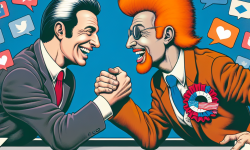
Desperate Times Call for Original Content
Disney is currently facing a significant challenge: attracting **young male audiences**, particularly those within the **Gen Z** demographic, aged 13 to 28. As reports indicate, the studio’s leadership has urged Hollywood creatives to develop original films to reinvigorate interest among this coveted group. While it may seem intuitive for any studio to seek greater engagement from young viewers, Disney’s focus on **original concepts** marks a notable shift, particularly given its reliance on established franchises like **Marvel and Star Wars**.
The Struggles of Beloved Franchises
The once-mighty cinematic giants, Marvel and Lucasfilm, have started to struggle with drawing in younger audiences. The superhero genre is witnessing a decline, with audiences becoming more selective about the films they choose to watch. One recent example is **Fantastic Four: First Steps**, which, despite high hopes and expectations, fell short of its predicted success. Meanwhile, the **Star Wars** franchise has left fans waiting for a significant film release for almost seven years. Such setbacks indicate that even the most popular franchises must evolve to retain interest.
Attracting Gen Z: The Challenge
Gen Z is characterized as a culture deeply influenced by technology and gaming, having faced unique challenges during their formative years, notably due to the **COVID-19 pandemic**. They are described as more connected to video games than traditional forms of entertainment. This presents a challenge for Disney, as they attempt to **reconnect with a generation** that feels alienated by traditional storytelling and movie formats. The importance of this demographic cannot be overstated; studies reveal that Gen Z men are exhibiting **loneliness and an obsession with gaming**, making them a complex audience to capture.
When nostalgia meets innovation
Disney’s past successes with films like **The Lion King** and **Toy Story** leveraged nostalgia to draw parents and their children. Simultaneously, films like **Lilo & Stitch** have proven to resonate strongly with male viewers, demonstrating that while Disney has a rich vault of cherished titles, reviving these iconic stories isn’t a silver bullet for attracting a young male audience today.
Despite the allure of nostalgia, Gen Z responds better to fresh and engaging content. A case in point is **Warner Bros.’ Minecraft Movie**, which proved to be a financial success through its roots in a game that this demographic cherished during their childhood. The viral trends surrounding films like **Minions: The Rise of Gru**, where young men brought suits and ties to the cinema, showcases a craving for **new experiences** rather than reboots of past successes.
Shifting Strategies and New Faces
Disney’s renewed pursuit for original intellectual property (IP) can be largely attributed to strategic appointments within their leadership. **David Greenbaum**, who previously co-headed Searchlight Pictures, was brought on board to head Disney’s live-action division. Greenbaum’s focus on developing films that resonate with male audiences suggests a shift towards tailoring productions that cater more specifically to Gen Z men’s interests.
Furthermore, the recruitment of **Daria Cercek**, former co-chief of Paramount Pictures, signifies an intention to bridge the gap between traditional Disney storytelling and modern cinematic preferences. Cercek’s experience with **franchise films like Sonic the Hedgehog** positions her to potentially identify new narratives that appeal to younger viewers.
The Broader Market Dynamics
The competitive landscape reveals that Disney holds approximately **10% of the ticket sales** from Gen Z demographics, putting them on par with **Sony Pictures** and **Paramount**. Although this indicates that they are not falling drastically behind competitors, the urgency for extensive engagement remains. Disney’s recent investment into **Fortnite**, a gaming phenomenon appealing directly to Gen Z, signals an awareness of the need for synergy between gaming and cinema. However, Disney does not hold movie rights for **Fortnite**, a missed opportunity that could have facilitated deeper connections with young audiences.
While Disney is braced to have a successful year at the box office, a repeated reliance on established franchises is increasingly seen as insufficient. CEO **Bob Iger** himself acknowledged the need for original storytelling to thrive, proclaiming that Disney aims to release films that resonate with audiences, breaking from a heavy reliance on pre-existing IP. This acknowledgment may indicate a growing awareness within Disney about the importance of cultural relevance.
Looking Ahead: The Future of Disney’s IP Strategy
The renewed commitment to original content may well be the key to unlocking Disney’s potential with Gen Z men. By crafting stories that resonate with their experiences, motivations, and curiosities, Disney can hope to rebuild a fanbase that has become disengaged in recent years. As the landscape of film continues to evolve, Disney faces the monumental challenge of creating fresh narratives that both respect the legacy of its iconic characters while also reflecting the contemporary experiences of **Gen Z**. As other studios scramble to adapt, only time will tell whether Disney’s new path holds the key to retaining its crown as the king of the box office.
Ultimately, the correlation between original storytelling and audience engagement cannot be overstated. Disney’s ability to innovate and evolve its strategy could define the landscape of cinema in the coming years and fortify its position within the industry.
To learn about the disclaimer of liability for the content of this website, click here



